Learning how to eat as an adult. Doesn’t this sound absurd? Unfortunately, this is how most of us are rendered now given the convoluted terrain of the nutrition industry; we mostly feel helpless and lost as to how and what we’re supposed to be consuming. Everywhere we look we’re sure to find a villain food, an opposing superhero food that will save us somehow, or some godsent (usually overly-restrictive) way of eating. I’m sure it drives you crazy because it drove me crazy…for about 5 years.
Like your average skinny teenager back in high school, I just wanted to get jacked. Practicing gymnastics and martial arts in my earlier years helped make me “fit”, but I was still skinny. I was really excited to pick up some free weights and start getting bigger. A year in, I got what I wanted: went from a weak 13x pounds to a whopping 175 by sophomore year. Most importantly, I got there eating a lot of whatever I wanted. Then the vanity itch came and my spiraling journey into learning how to eat started.
Note: please read the following keeping in mind that I continually stuck with weight training throughout this whole experience. The variable of training/fitness/exercise was pretty constant. Also, there’s a lot of links throughout. Please click on them. Revisit them from time to time.
The Bro Diet (aka bodybuilder’s delight aka “brotrition”)
Being bigger and stronger weren’t enough as I started college. I had to be lean as well and the only way was through adopting a strict diet (right?). Naturally, I fell in with that crowd at my local 24 Hour Fitness. You know, the guys who are the most jacked and always seem to grunt and slam weights. What they taught me would come to control my life for about two years:
- Count those calories and keep them low;
- Get your macronutrients in line;
- Carbs are what make you soft/fat so keep those really low and try cutting them out completely sometimes;
- You must eat every 2 hours or else your muscles atrophy;
- Protein should make up 50%+ of your daily intake; and
- Nutrient timing is key to unlocking your physique.
That’s it? No problem. I’ll just carry a huge lunch box around campus like a badass and get irritated when I “miss a meal” and experience slight edema every time I consume larger amounts of carbs/calories. Needless to say, I was run down towards the tail end of this crazy diet. Were there results? Of course, but I didn’t truly realize why until later on. No, it wasn’t my 2:1 recovery shake post-workout or my “empty stomach cardio“. What’s more is that these results never lasted and quality of life was pretty low.
Takeaways:
This was just not a logical way to be eating. There is really no scientific validity behind claims such as meal frequency for muscle retention, nutrient timing (for regular Joes anyway), the necessity for shelf after shelf of supplements, and that protein intake should be that high. What this way of eating did teach me was the importance of calories and, towards the leaner end of the spectrum, macronutrient composition. This was the true reason I saw results in conjunction with training. Other than this, it’s just silly.
Paleo (aka caveman diet and dogma)
Any diet that involves you eating fewer calories than you burn will result in weight loss. Any diet that includes eating more calories than you burn will result in weight gain. Nobody’s body breaks the laws of physics. –Stumptuous aka Krista-Scott Dixon
As a college student, I was naturally inclined to be inquisitive. Having my life revolve around tupperware meals didn’t seem logical or sustainable (you think!?) so I started stumbling around on the interwebs to sample some “scientific” information from various blogospheres. At around the same time I started CrossFit (you see where this is going) and this book kept popping up called The Primal Blueprint. Eat like a caveman and get ripped? Why not? It was right in front of me the whole time: there was a certain food to blame for my woes. Old man Sisson was not only jacked, but he told me what I wanted to hear:
- Calories should not be the focus of your diet;
- Eat whenever you want;
- Just eat whole, organic, local, expensive, colorful, “sustainable” foods;
- Just make sure it’s just meat, vegetables, nuts, and some fruit;
- Eat tons of fat because it doesn’t raise insulin (<–read this!), which makes you fat;
- Dairy should be avoided;
- Oh, and avoid anything to do with grains because they’re the antichrist;
That’s it!? Easy. Well, sort of. I needed some kind of structure so I found this awesome website called Whole9life to guide me (horrible). I was well on my way to becoming some kind of saint, or at least that’s how literature in this (dark) area of the nutrition world made me feel. I mean, I didn’t want to develop the beetus or any other modern ailments that wheat caused. What actually happened was I got softer, weaker, and began developing an unhealthy and snobby demeanor about food. I didn’t want to develop the orthorexia, so I had to make a change…an intermittent change if you will.
Takeaways:
If you’re a sedentary individual with no real aspirations to get stronger through weight training (…), then this diet is beneficial for you. People who don’t demand much out of their skeletal muscles don’t need that much carbohydrates, but making the decision to go Ketogenic is not the best idea. Your body needs carbohydrates to function regardless. Don’t take this statement to mean a carb-focused diet. You need a balance of the macronutrients to keep the body running well. That balance is dependent on you, your daily activity, and lifestyle. If you lift, eat more carbs.
What this diet taught me was that real, whole foods should always make up the bulk of your diet and that fat is very important to overall bodily function. However, food avoidance isn’t the answer. This is just side-stepping the reality of accountability. CALORIES MATTER. Food choice really comes down to individual preference and tolerance. If it makes you feel better to buy organic over conventional, then great, but you should NEVER feel guilty or make others feel guilty about what you/they choose to eat (how much is a different story).
Intermittent fasting (aka the magic bullet)
Click on this link and look at Martin Berkhan. I don’t know if “jacked” is sufficient enough of a term to describe this guy’s body composition. Who wouldn’t want to be this lean? I stumbled onto his website with the help of old man Sisson and some other random Paleos. Turns out what he was preaching was in line with our SPECULATIONS about how our early counterparts ate. After some in-depth (countless hours) of reading through his blog, I was sold. This was the magic bullet I was looking for. It taught me some new (research-based) ideas and seemed to consolidate principles from the previous diets I went through:
- Calories do matter, so count them;
- Get those macros in line;
- 16/8 — fast/eat schedule on the daily;
- Squeeze meals into that 8 hour window beginning with the largest first;
- Don’t be rigid with your eating habits and food choice (except keep that 16/8 as much as you can);
- Fasting accelerates the fat burning mechanism of the body.
I started eating at 2p and stopped eating at 10p everyday for about 8 months. Kept track of my calories and macros and kept on lifting heavy. Needless to say, this was just way too stressful for me. What if I was out and got hungry around midnight? Did my window just shift!? But I wanted to believe really bad at this point.
Takeaways:
To quote Alan Aragon, “intermittent fasting is practical, but not magical.” Simply put, it’s not for everyone. It definitely wasn’t for me. It really drove home the fact that you don’t need to stuff your face every few hours. You can go even longer without food and break the chains of the conventional hours you’re so accustomed to eating without hindering your body function in anyway. After all, life does happen. The most important thing I took away here was that we always forget how smart the human body is. We give it credit for adapting to environmental demands and getting stronger to allow us to live, but we want to treat it like a porcelain doll when it comes to food.
Making Sense of Everything
People love and have been conditioned to accept being told what to eat, how to eat, and what to avoid eating. There’s just so many methods and conflicting information out there, it’s hard to parse through. There’s this mental alleviation when we can say there’s just a single or a few culprits at the root of a problem. It makes life easier to deal with and it mitigates the burden of accountability. But this oversimplifies the complex interplay of a multitude of variables such as sleep, work, community structure, genetics, activity level, etc. It’s rarely ever one cause to a problem, but we seek out culprits such as sugar, grains, and gluten to be the scapegoats. The current state of the nutrition/fitness industry is driven by alarmist and dogmatic literature and propaganda that would have you think this way.
It is always about context; we always miss the forest for the trees. I think back on this crazy journey of mine and this was exactly my fault. It was easy to say carbs were the bad guy and analyze my life in the context of a day. It was much harder to see the big picture and analyze my life in the context of weeks and months. Luckily, I kept on seeking answers and found my stride through reading top players in the field like Alan Aragon, Stephan Guyenet, Martin Berkhan, and Lyle McDonald (to name a few) who utilized real science to help the masses understand nutrition objectively (if you’re willing to struggle a little and learn).
As a result, I developed much more flexible means of eating all while keeping my body composition in check, gaining strength, and feeling the best I’ve ever felt. I began thinking more like the tenth man when reading through the interwebs and fad diets. I became more accountable for how much I ate rather than what I ate because I learned that dosage AND context were what mattered most. Overall, I just wanted to take more control of my health and though this journey pretty much took me full circle it would have meant nothing if I didn’t make an effort to learn as much as I could from it.
—————————————–
Rest day


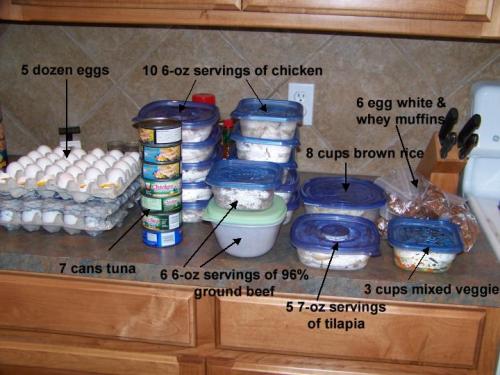
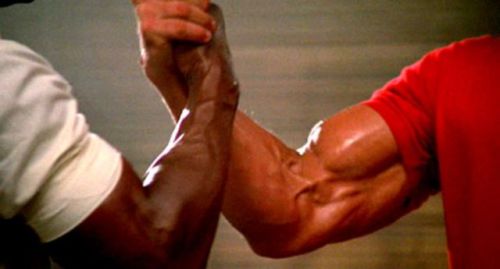
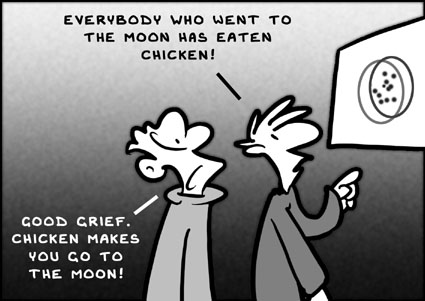
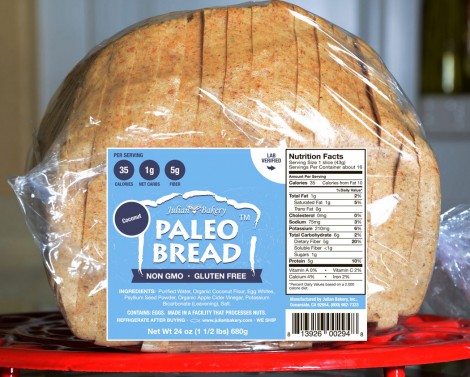
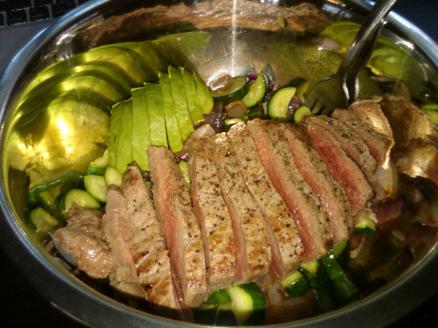
Hey man, thanks for the link. Looks like you’re following a lot of the right people, good luck. Been through a lot of this myself — glad to see you’ve made such progress.
Best,
– Armi
No problem, Armi and thanks! I loved your article and I really appreciate you reaching out. Even better to know you’ve been there as well. I’ve recommended your article to all my clients and peers. Keep up the great work!